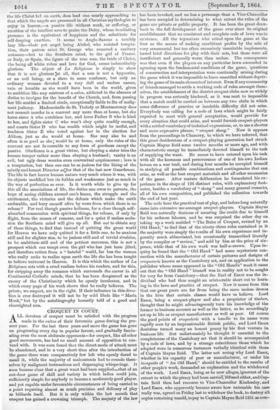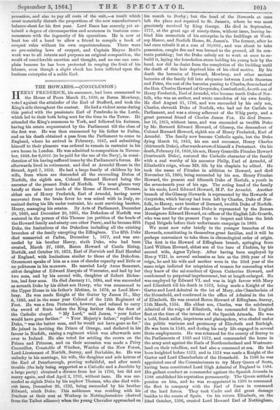CROQUET IN COURT.
ALL devotees of croquet must be satisfied with the progress made in the en/04s of their favourite game during the pre- sent year. For the last three years and more the game has gone on progressing every day in popular favour, and gradually fascin- ating even the most obdurate opponents—for croquet, like all other good movements, has had no small amount of opposition to con- tend with. It was soon found that the direct mode of attack must be abandoned, and in a very short time after the introduction of the game there were comparatively few left who openly dared to assail it, while the majority of malcontents had to console them- selves by malignant insinuations and disparaging whisperings. It soon became clear that a great want had been supplied—that of an out-door game of skill and variety in which ladies could join, sufficiently simple for anybody to become a moderately good player, and yet capable under favourable circumstances of being carried to a point requiring almost as much precision and delicacy of play as billiards itself. But it is only within the last month that croquet has gained a crowning triumph. The majesty of the law
has been invoked, and no less a personage than a Vice-Chancellor has been oocupied in determining to what extent the rules of the game are private or public property. It has been the great draw- back to the full development of the game ever since its original establishment that no consistent and complete code of laws was in existence. All the toymakers who seized upon the game at the first as the means of making exorbitant profits by the sale of very ornamental but too often excessively unsuitable implements, issued brief directions for play with their sets, but these were all insufficient and generally worse than useless. The consequence was that even if the players on any particular lawn succeeded in agreeing upon the fundamental conditions of the game, questions of construction and interpretation were continually arising during the game which it was impossible to leave unsettled without depriv- ing the game of its main elementsof interest. Even if anycommunity of friends managed to settle a working code of rules amongst them- selves, the establishment of the district croquet clubs now so widely in progress was seriously hindered, as it was next to impossible that a match could be carried on between any two clubs in which some difference of practice or insoluble difficulty did not arise. Everybody was calling for a code of laws which might be fairly expected to meet with general acceptation, would provide for every situation that could arise, and would furnish croquet-players witha settled vocabulary of technical expressions, or, to use a shorter and more expressive phrase, "croquet slang." Now it appears from the proceedings in Chancery, to which we have referred, that this great desideratum of a croquet-playing generation had struck Captain Mayne Reid some twelve months or more ago, and with characteristic energy he immediately devoted himself to the task of supplying the want. He seems to have entered upon his task with all the keenness and perseverance of one of his own Indian heroes on a war trail, and during four months he occupied himself in studying all possible combinations and contingencies that can arise, as well as the best croquet materials and all other necessaries of the game. After mature deliberation he formulated his ex- perience in the shape of 126 distinct rules, with explanatory foot- notes, besides a vocabulary of " slang " and many general remarks, all of his own composition, and published the collection towards the end of last year.
The code bore the practical test of play, and before long naturally came into extensive use amongst croquet-players. Captain Mayne Reid was naturally desirous of securing the credit due to himself for his arduous labours, and he was surprised the other day on taking up a work entitled "The Rules of Croquet, revised by an Old Hand," to find that of the ninety-three rules contained in it the majority were simply the results of his own experience and in- genuity much abbreviated, but occasionally transcribed literally by the compiler or "reviser," and sold by him at the price of six- pence, while that of his own work was half-a-crown. Upon in- quiry he found that the "Old Hand" had some mysterious con- nection with the manufacturer of certain patterns and designs of croqueterie known as the Cassiobuty set, and on application to the publisher whose name appeared in the "Old Hand's" work it came out that the "Old Hand" himself was in reality not to be sought- for very far from Cassiobury—that the Earl of Essex was the in- dividual who had thus sought an aristocratic short cut to learn- ing in the laws and practice of croquet. Now it seems from this that our great peers are far from being the mere useless drones in the hive that certain classes would have us believe. Lord Essex, being a croquet-player and also a proprietor of timber, thought that he might advantageously turn his knowledge of the former to business account as well as the latter, so he accordingly set up in life as croquet manufacturer as well as peer. Of course the good points of croquelerie with a handle to its name were rapidly seen by an impressionable British public, and Lord Essex doubtless turned many an honest penny by his first venture in business life. But unfortunately he thought it essential to the completeness of the Cassiobury set that it should be accompanied by a code of laws, and by a strange coincidence those which he adopted were in numerous instances verbally identical with those of Captain Mayne Reid. The latter not seeing why Lord Esser, whether in his capacity of peer or manufacturer, or under his incognito of "An Old Hand," should be entitled to the results of other people's work, demanded an explanation and the withdrawal of the work. Lord Essex, being as he now alleges, ignorant of the extent to which the piracy had been carried, refused either, and Cap- tain Reid then had recourse to Vice-Chancellor Kindersley, and Lord Essex, who apparently became aware how untenable his case really was, agreed on Friday last to withdraw the book, to destroy all. copies remaining =sold, topay to Captain Mayne Reid 1251. as °Dm- pensation, and also to pay all costa of the suit,-a result which must materially disturb the proportions of the new manufacturer's balance-sheet for his first year. Lord Eager has scarcely yet at- tained a degree of circumspection and acuteness in business com- mensurate with the ingenuity of his operations. He is now at least too old a hand to allow a friend to compile a book of croquet rules without his own superintendence. There were no pre-existing laws of croquet, and Captain Mayne Reid's work was to all intents and purposes an original composition, the result of condierable exertion and thought, and no one can com- plain because he has been protected in reaping the fruit of his labours, even though a slight check has been inflicted upon the business enterprise of a noble Earl.































 Previous page
Previous page